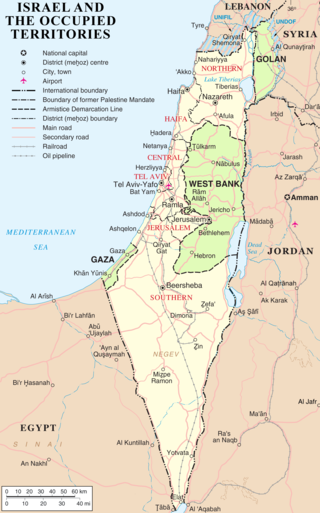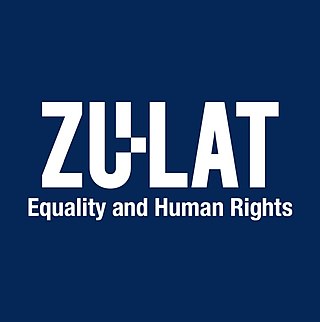
Israeli settlements, also called Israeli colonies, are the civilian communities built by Israel throughout the Israeli-occupied territories. They are populated by Israeli citizens, almost exclusively of Jewish identity or ethnicity, and were first established after Israel's victory in the Six-Day War of June 1967. The international community considers Israeli settlements to be illegal under international law, but Israel disputes this. The expansion of settlements often involves the confiscation of Palestinian land and resources, leading to displacement of Palestinian communities and creating a source of tension and conflict. Settlements are often protected by the Israeli military and are frequently flashpoints for violence against Palestinians. Further, the presence of settlements and Jewish-only bypass roads creates a fragmented Palestinian territory, seriously hindering economic development and freedom of movement for Palestinians.
The Law of Return is an Israeli law, passed on 5 July 1950, which gives Jews, people with one or more Jewish grandparent, and their spouses the right to relocate to Israel and acquire Israeli citizenship. Section 1 of the Law of Return declares that "every Jew has the right to come to this country as an oleh [immigrant]". In the Law of Return, the State of Israel gave effect to the Zionist movement's "credo" which called for the establishment of Israel as a Jewish state. In 1970, the right of entry and settlement was extended to people with at least one Jewish grandparent and a person who is married to a Jew, whether or not they are considered Jewish under Orthodox interpretations of Jewish law.

The Arab citizens of Israel are the country's largest ethnic minority. According to most reliable sources, the majority of Arabs in Israel now prefer to be identified as Palestinian citizens of Israel and are colloquially referred to in Arabic as either 48-Arabs or 48-Palestinians, denoting the fact that they have remained in Israeli territory since the Green Line was agreed upon between Israel and the Arab countries as part of the 1949 Armistice Agreements. International media outlets often use the term "Arab-Israeli" or "Israeli-Arab" to distinguish Israel's Arab citizens from the Palestinian Arabs residing in the Israeli-occupied territories. They are formerly, or are descended from, those Arabs who belonged to the British Mandate for Palestine through Palestinian Citizenship Order 1925. Speakers of both Arabic and Hebrew, they self-identify in a wide range of intersectional civic, national, and religious identities.

Moshe Zalman Feiglin is a far-right Israeli politician and activist, and the leader of libertarian Zionist party Zehut. A member of Likud, he headed the Manhigut Yehudit faction within the party, and represented Likud in the Knesset between 2013 and 2015.
Yisrael Beiteinu is a secularist, conservative, nationalist and right-wing political party in Israel. The party's base was originally secular Russian-speaking Israelis, although support from that demographic is in decline. The party describes itself as "a national movement with the clear vision to follow in the bold path of Zev Jabotinsky", the founder of Revisionist Zionism. It has primarily represented immigrants from the former Soviet Union, although it has attempted to expand its appeal to more established Israelis.

Avigdor Lieberman is a Soviet-born Israeli politician who served as Minister of Finance between 2021 and 2022, having previously served twice as Deputy Prime Minister of Israel from 2006 to 2008 and 2009 to 2012.

Reuven "Ruvi" Rivlin is an Israeli politician and lawyer who served as the tenth president of Israel between 2014 and 2021. He is a member of the Likud party. Rivlin was Minister of Communications from 2001 to 2003, and subsequently served as Speaker of the Knesset from 2003 to 2006 and 2009 to 2013. On 10 June 2014, he was elected President of Israel. His term ended on 7 July 2021.

Israel has occupied the Palestinian territories and the Golan Heights since the Six-Day War of 1967. It previously occupied the Sinai Peninsula and southern Lebanon as well. Prior to Israel's victory in the Six-Day War, occupation of the Palestinian territories was split between Egypt and Jordan, with the former having occupied the Gaza Strip and the latter having annexed the West Bank; the Sinai Peninsula and the Golan Heights were under the sovereignty of Egypt and Syria, respectively. The first conjoined usage of the terms "occupied" and "territories" with regard to Israel was in United Nations Security Council Resolution 242, which was drafted in the aftermath of the Six-Day War and called for: "the establishment of a just and lasting peace in the Middle East" to be achieved by "the application of both the following principles: ... Withdrawal of Israeli armed forces from territories occupied in the recent conflict ... Termination of all claims or states of belligerency and respect for and acknowledgment of the sovereignty, territorial integrity and political independence of every State in the area and their right to live in peace within secure and recognized boundaries free from threats or acts of force."
Elections for the 17th Knesset were held in Israel on 28 March 2006. The voting resulted in a plurality of seats for the then-new Kadima party, followed by the Labor Party, and a major loss for the Likud party.

Israel's policies and actions in its ongoing occupation and administration of the Palestinian territories have drawn accusations that it is committing the crime of apartheid. Leading Palestinian, Israeli and international human rights groups have said that the totality and severity of the human rights violations against the Palestinian population in the occupied territories, and by some in Israel proper, amount to the crime against humanity of apartheid. Israel and some of its Western allies have rejected the accusation, with the former often labeling the charge antisemitic.
International human rights organizations, along with the United Nations, and the United States Department of State, have reported human rights violations committed by the State of Israel, particularly against minority groups. These reports include violations of the rights of Palestinians, both inside and outside Israel as well as other groups in Israel.

The Lieberman Plan, also known in Israel as the "Populated-Area Exchange Plan", was proposed in May 2004 by Avigdor Lieberman, the leader of the Israeli political party Yisrael Beiteinu. The plan suggests an exchange of populated territories – territories populated by both Arabs and Jews – between Israel and the Palestinian Authority.
Palestinian citizens of Israel, also known as 48-Palestinians are citizens of Israel that self-identify as Palestinian. No official statistics exist on this population; according to Israel's Central Bureau of Statistics, the Arab population in 2023 was estimated at 2,080,000, representing 21.1% of the country's population.
Basic Law: Israel as the Nation-State of the Jewish People, informally known as the Nation-State Bill or the Nationality Bill, is an Israeli Basic Law that specifies the country's significance to the Jewish people. It was passed by the Knesset—with 62 in favour, 55 against, and two abstentions—on 19 July 2018 and is largely symbolic and declarative in nature. The law outlines a number of roles and responsibilities by which Israel is bound in order to fulfill the purpose of serving as the Jews' nation-state. However, it was met with sharp backlash internationally and has been characterized as racist and undemocratic by some critics. After it was passed, several groups in the Jewish diaspora expressed concern that it was actively violating Israel's self-defined legal status as a "Jewish and democratic state" in exchange for adopting an exclusively Jewish identity. The European Union stated that the Nation-State Bill had complicated the Israeli–Palestinian peace process, while the Arab League, the Palestine Liberation Organization, the Organization of Islamic Cooperation, and the Muslim World League condemned it as a manifestation of apartheid.

Haneen Zoabi, is a Palestinian-Israeli politician. The first Arab woman to be elected to the legislature on an Arab party's list, she served as a member of the Knesset for the Balad party between 2009 and 2019. In 2021, she was convicted of forgery and fraud after pleading guilty.

Ahmad Tibi is a Palestinian-Israeli politician. The leader of the Ta'al party, he has served as a member of the Knesset since 1999. Tibi was acknowledged as a figure in the Israeli-Palestinian arena after serving as a political advisor to the late Palestinian president Yasser Arafat (1993–1999).

Bezalel Yoel Smotrich is an Israeli far-right politician and lawyer who has served as the Minister of Finance since 2022. The leader of the National Religious Party–Religious Zionism, he previously served as a Knesset member for Yamina.

The Amendment No. 28 to the Entry Into Israel Law prohibits the entry into Israel of any foreigner who makes a "public call for boycotting Israel" or "any area under its control" – a reference to the Israeli settlements. It denies entry, visa and residency permits to these affected foreigners.

Zulat for Equality and Human Rights is an Israeli research institute operating as a nonprofit organization whose aim is to promote left-wing policies. It supports Israeli political and other bodies that work toward enhancing values and achieving goals identified with a left-liberal worldview: bolstering human rights, civil rights, equality, and partnership among all sectors of Israeli society. The advancement of these goals is primarily conducted in the political arena by means of information campaigns and Lobbying vis-a-vis decisionmakers in the Israeli Government and the Knesset, the creation of data resources by means of funding research, and the active presentation of information to decisionmakers in order to impact on the political echelon and on influencers in the Media.

Far-right politics in Israel describes ideologies such as ultranationalism, Jewish supremacy, Jewish fascism, and Anti-Arabism as they manifest in Israel. The term "far-right" is mainly used to describe those who advocate for policies such as the expansion of Israeli settlements in the West Bank, opposition to Palestinian statehood, and imposition of Israeli sovereignty over the West Bank and the Gaza Strip. Kahanism is an example of a far-right ideology active in Israeli politics.














